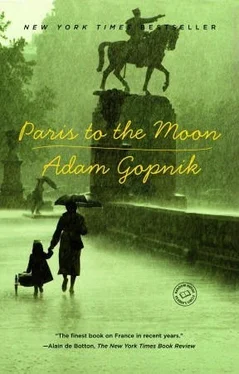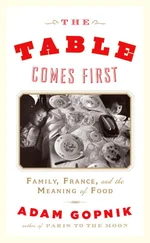Yet fifty years after the classic period, one café is more fashionable than ever and the other is not fashionable at all. You might not see this at once. At the Flore the fashionable people are spread out among the tables rather than concentrated in one spot or area; they occupy the place clandestinely, following the law of Inverse Natural Appeal. The terrasse of the Flore, even on a sunny and perfect day (especially on a sunny and perfect day), is off limits; the inner room, with its red moleskin banquettes, is acceptable; but by far the most OK place to sit is upstairs (I was sitting there now, with my friend), and the banquettes are made of an ugly tan leatherette. (The law of Inverse Natural Appeal is at work: The outlawed terrasse is, as it happens, an extraordinarily pleasant place to sit; the inner room is a very pleasant place to sit; and the upstairs room is reminiscent of the cocktail lounge of a Howard Johnson’s.)
The sounds of the higher French conversation, with its lovely murmur of certainties and, rising from the banquettes, the favorite words of fashionable French people, resonated all around. Perversite, which means “perversity” but is used as a word of praise, suggests something—a book, a dish, a politician—that is aristocratic. C’est normal, which means something like “No problem” and can also refer to any political or literary situation, is different from the American phrase in that its emphasis is not on a difficulty surmounted or evaded but on the return to a familiar, homeostatic atmosphere of comfort: Something that happens may seem unusual (say, the revelation that a former defense minister might have been an East Bloc agent) but, properly understood, is not shocking at all; it’s normal, even if a little deplorable. And from table after table, like the sound of a tolling bell, rises the connective donc, which just means “so” or “therefore,” but, when used in literary and worldly conversation, and rung with sufficient force, means “It must therefore follow as the night the day” and always sounds to me as conclusive as Gideon’s trumpet.
“But it all has to do with the character of two men, Boubal and Cazes,” my friend said. Paul Boubal was the owner of the Flore from 1939 to 1983—he died five years later—and Roger Cazes was the owner not of the Deux Magots but of the Brasserie Lipp, across the street. “That is to say, both Gazes and Boubal were from the Auvergne—they were countrymen—and though each thought the other was running a sneaky business, each respected the other and frequented the other’s place. This produced, in the fifties, a natural compact, a kind of family feeling between the two places. I mean family feeling in the real sense—of dependence and suspicion and resentment. The owner of the Deux Magots was a much more timid fellow. He was left out of the compact.” So the real force working was that of the Lipp; it was the third planet, perturbing the orbits of the two others.
There it was, the explanation in terms of the romantic individual in almost perfect form, along with the bonus of a touch of terroir, the French affection for a bit of native land. Then someone suggested that I speak to the essayist and editor Jean-Paul Enthoven, who is the author of the season’s most winning collection of literary essays, Les Enfants de Satume. Enthoven, I was told, would be sure to have an explanation; he could explain anything Parisian.
“Here is my hypothesis,” he announced when I reached him on the phone at his office, at the publishing house of Grasset. “You must go back to the twenties and thirties, when the Flore became identified with the extreme right and the Deux Magots, by default, with the left. Charles Maurras, the founder of Action Francaise, used the Flore as his home base.” Maurras was simultaneously one of the most important stylists in French literature—a member of the French Academy, and a crucial influence on T. S. Eliot, among other modernists—and a right-wing anti-Semite. “Before it was anyone else’s place, it was Maurras’s. His most famous polemic was even named after the café: ‘Au Signe de Flore.’ Maurras was a malevolent force, in that everything he touched was simultaneously disgraced and hallowed.”
Enthoven went on to say, “This meant that by the time of the occupation, when Sartre and Simone de Beauvoir came to Saint-Germain and began their resistance, they had to avoid the Flore like a plague, since it had been contaminated by Maurras. But then the tourists began to crowd into the Deux Magots in order to look at Sartre and de Beauvoir. The place became overcrowded, and eventually the intellectuals noticed the emptiness of the Flore next door. By then Maurras was gone, the occupation had passed, and confronted with a choice between the pollution of Maurras and the pollution of tourism, the intellectuals chose to remake the emptiness rather than abide with the many. So they went across the street and have never returned.” He stopped for a second, as if readying himself for an aphorism, and then said, “The Deux Magots was sacralized by Sartre, desacralized by the tourists, and then left vacant by history.” Eighteen-seventy, 1940, I thought. Like so many lovely things in Paris, the two cafés were given shape by the first German invasion and then in one way or another were deformed by the second.
It was left to another, more dour friend to supply the futility-of-explanation explanation, over coffee at a lesser, more despairing café—neither fashionable nor unfashionable, just a place where you go to talk. “There is nothing to explain here,” he said. “The explanation is a simple, Saussurean one.” He was referring, I realized after a moment, to the father of modern linguistics, who was the first to point out that signs get their meanings not by being like the things they stand for but by being different from other signs: A sign for black means black because it isn’t like the sign for white.
“The fashionable exists only in relation to something that is not that way,” he went on. “The relationship between the modishness of the Flore and the unmodishness of the Deux Magots isn’t just possibly arbitrary. It’s necessarily arbitrary. If you place any two things side by side, one will become fashionable and the other will not. It’s a necessity determined by the entire idea of fashion. A world in which everything is fashionable is impossible to imagine, because it implies that there would be nothing to provide a contrast. The reason that when you place any two things side by side, one becomes chic and the other does not is that it’s in the nature of desire to choose, and to choose absolutely. That’s the mythological lesson of the great choice among the beauties: They are all beautiful—they are goddesses—and yet a man must choose. And what was the chooser’s name? Paris. C’est normal.”
Distant Errors, Christmas Journal 2
My fax machine, which was made by the French state, always blames someone else when things go wrong. It is a Galeo 5000 model, and it is made by France Telecom and is therefore an official, or French government, product; even its name carries with it the nice implication that 4,999 other models were attempted before perfection was at last achieved by the French fax machine ministry.
You even have to go to a government telephone outlet to buy a new ribbon for it. It’s a plain paper fax (you have the same expression in French, papier ordinaire, ordinary paper) with all the usual features. It’s really very nicely designed—much better designed than its American equivalents, with that streamlined, intelligent Philippe Starck look that the French seem magically able to give to everything they make. It’s reasonably efficient too—perhaps a little overtricky in loading in the sheets and unduly inclined to bourrage de papier, paper jams—but still…
Читать дальше












